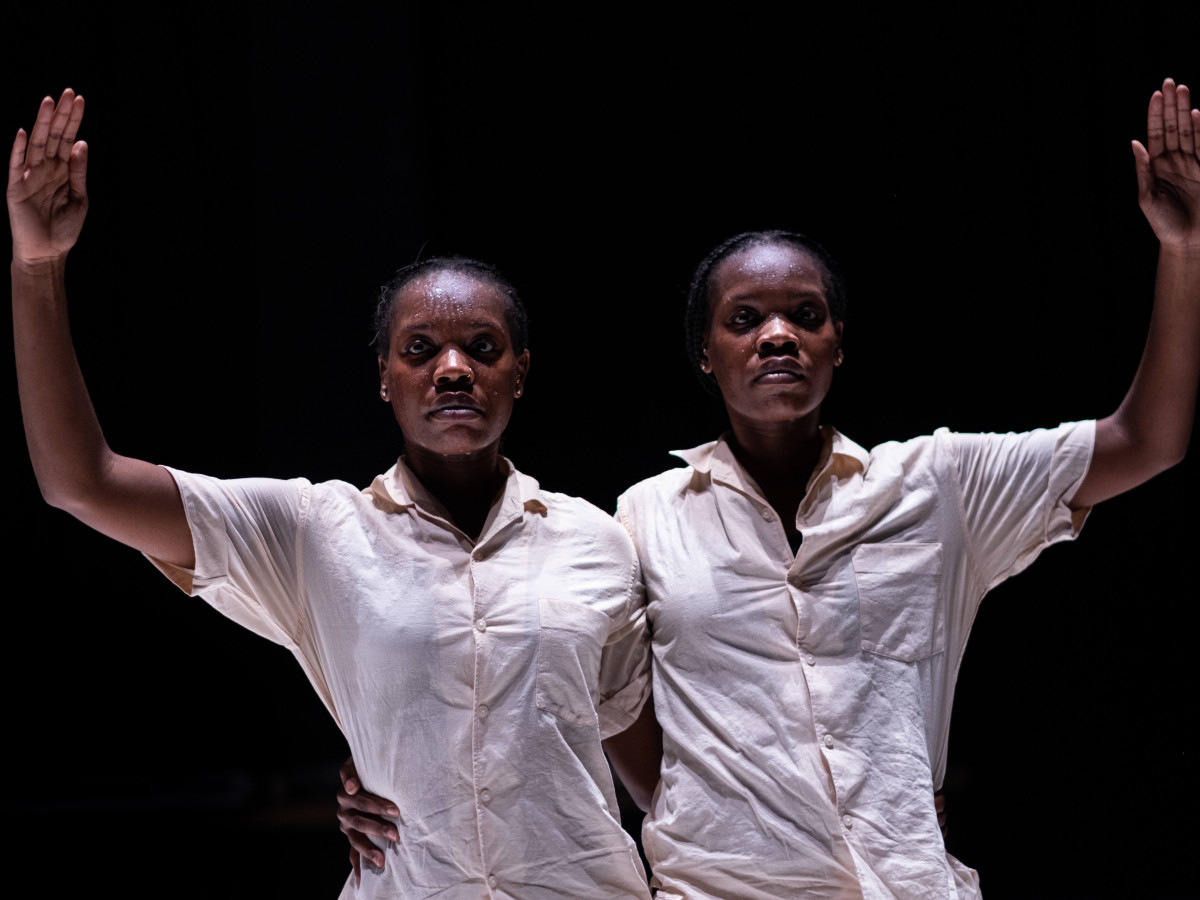 © Stef Stessel
© Stef Stessel
 © Stef Stessel
© Stef Stessel
 © Stef Stessel
© Stef Stessel
Domination must envelop the subjugated, the colonised, and maintain them in a more or less permanent state of trance, intoxication, and convulsion so that they are incapable of thinking lucidly for themselves. – Achille Mbembe
On 1 and 2 March, artist Roland Gunst_John K Cobra brings his performance SPIRIT CAPITAL to the stage of the Market Theatre in Johannesburg. This presentation is choreographed by Moya Michael, and performed by Doris Bokongo Nkumu and Nathalie Bokongo Nkumu.
SPIRIT CAPITAL refers to an object from the Congolese Luba tradition: a wooden headrest, usually with two identical female figures at its base. These objects serve as ‘lieux de mémoire’, or spirit and history containers. They are part of a complex, reflective and historical infrastructure within the Luba community.
Two female, outwardly identical performers move through the theatre space. The stage design evokes the ‘Tropical Bungalow’, a residential structure installed by the colonizer in the Congo and organized according to the principle of ‘zoning’: the strict separation of circulation space for whites (the colonial residents) and blacks (the local domestic staff). The so-called boys, the black youths who worked there, began to copy the behaviour and style of the white ruler and appropriate them in all sorts of ways. This was the start of a rich tradition of ‘Sapologie’ or ‘SAPE’: performative identity practices of Congolese dandies, a counterculture to the spatial, social and racial classification of bodies.
SPIRIT CAPITAL transforms the stage into a ritualized place and invites viewers on a spatial and mental journey in which historically oppressed bodies can cast off the chains of history and free themselves through movements, words, sounds, music and changes to their appearance.
TALK
The performance on 2 March will be preceded by a discursive event. In this conversation SPIRIT CAPITAL is used as a prompt to discuss the psychology of space, the manifestation of history, possible contemporary understandings of identity, and the performativity of memory within a South African context. With: Dr. Nosipho Mngomezulu, Dr. heeten bhagat, Gilbert Balinda, Slindile Mthembu, Roland Gunst, and Samara Ragaven. By applying the speakers' expertise in Anthropology, Psychology, Theatre/Performance, Art and Architecture, the audience is invited to an exercise in transdisciplinary exchange and deep listening.
The talk will take place at the Market Theatre from 11:00 am to 2:30 pm (with breaks) on 2 March, and is followed by the performance at 3 pm.
Concept & direction: Roland Gunst_John K Cobra
Choreography: Moya Michael
Performers: Doris Bokongo Nkumu & Nathalie Bokongo Nkumu (Les Mybalés)
Text: Roland Gunst_John K Cobra & Esther Severi
Dramaturgy: Esther Severi
Soundscape: Laryssa Kim
Lightdesign: Stef Stessel
Scenography & costumes: Andrea Kränzlin
Engineer: Pieter Kint
Production: John K Cobra Institute of Videoartfacts, Moussem Nomadic Arts Centre
Co-production: deSingel, Kunstencentrum Vooruit, Kaaitheater, d e t h e a t e r m a k e r
Supported by: The Flemish Community, VGC and the Algemene Afvaardiging van de Vlaamse Regering in zuidelijk Afrika, Sabam
Thanks to: Arsenaal/Lazarus, Latitudes Art Fair, The Centre for the Less Good Idea, The Market Theatre
Curator
Nisha Merit
Speakers
Dr. Nosipho Mngomezulu
Dr. heeten bhagat
︎︎︎Gilbert Balinda
Roland Gunst
Samara Ragaven
Slindile Mthembu

Domination must envelop the subjugated, the colonised, and maintain them in a more or less permanent state of trance, intoxication, and convulsion so that they are incapable of thinking lucidly for themselves. – Achille Mbembe
On 1 and 2 March, artist Roland Gunst_John K Cobra brings his performance SPIRIT CAPITAL to the stage of the Market Theatre in Johannesburg. This presentation is choreographed by Moya Michael, and performed by Doris Bokongo Nkumu and Nathalie Bokongo Nkumu.
SPIRIT CAPITAL refers to an object from the Congolese Luba tradition: a wooden headrest, usually with two identical female figures at its base. These objects serve as ‘lieux de mémoire’, or spirit and history containers. They are part of a complex, reflective and historical infrastructure within the Luba community.
Two female, outwardly identical performers move through the theatre space. The stage design evokes the ‘Tropical Bungalow’, a residential structure installed by the colonizer in the Congo and organized according to the principle of ‘zoning’: the strict separation of circulation space for whites (the colonial residents) and blacks (the local domestic staff). The so-called boys, the black youths who worked there, began to copy the behaviour and style of the white ruler and appropriate them in all sorts of ways. This was the start of a rich tradition of ‘Sapologie’ or ‘SAPE’: performative identity practices of Congolese dandies, a counterculture to the spatial, social and racial classification of bodies.
SPIRIT CAPITAL transforms the stage into a ritualized place and invites viewers on a spatial and mental journey in which historically oppressed bodies can cast off the chains of history and free themselves through movements, words, sounds, music and changes to their appearance.
TALK
The performance on 2 March will be preceded by a discursive event. In this conversation SPIRIT CAPITAL is used as a prompt to discuss the psychology of space, the manifestation of history, possible contemporary understandings of identity, and the performativity of memory within a South African context. With: Dr. Nosipho Mngomezulu, Dr. heeten bhagat, Gilbert Balinda, Slindile Mthembu, Roland Gunst, and Samara Ragaven. By applying the speakers' expertise in Anthropology, Psychology, Theatre/Performance, Art and Architecture, the audience is invited to an exercise in transdisciplinary exchange and deep listening.
The talk will take place at the Market Theatre from 11:00 am to 2:30 pm (with breaks) on 2 March, and is followed by the performance at 3 pm.